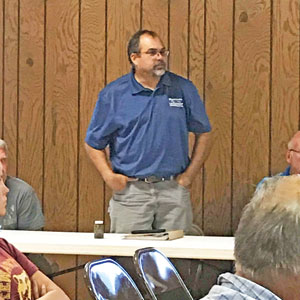August 7, the Ostrander City Council held a regular meeting, with all members in attendance (Stephanie Start, Dan Hellerud, DJ Start, Vernon Thompson, Mayor Pam Kunert, and City Clerk Wendy Brincks). The main topic discussed was citizens’ concerns about tap water that is rusty and/or foul-smelling.
Brian Malm, of Bolton & Menk Inc., shared basic information about how and why cities sometimes have such issues with the water, as well as options that may help solve the problem. He stated, “As the council had requested, we did some testing on the water, related to the iron complaints that you’ve been getting.” He explained that several residences, plus the city’s “raw” water (from the well) and “finished” water (from the treatment plant) were tested. He shared information from a letter he’d sent to the city, which stated, in part, “Iron is not a regulated contaminant and does not pose a public health risk… While it is possible to construct centralized filtration systems to remove iron, most cities do not… simply due to the cost, which would be several million dollars and would not be eligible for any type of state/federal funding due to the fact that iron does not pose a health risk.”
Malm then summarized the testing results, showing that the raw water ranged from .23 to .32 mg/l (and this is within the historical normal levels for Ostrander’s raw water). The finished water tested at .32 mg/l. The residences ranged between .28 mg/l to 1.91 mg/l. The letter stated, “These results tell us that the high iron levels in the homes with the complaints are likely coming from iron sediment deposits, either in the watermains or in the homes themselves.” Malm stated that next year’s planned replacement of some watermain in the city will likely help, and that more frequent flushing of the lines may help also. He voiced an understanding of the frustrations of citizens who are having rusty water issues in their homes.
Rick Whitney of Peopleservice showed a small jar of very dark water that was collected after the most recent flushing this summer. He talked about the chlorine levels in the city’s water, and described the delicate balance in trying to find a level high enough to provide safe water but low enough to avoid over-oxidizing and/or a chlorine taste to the water. He summarized that he agreed with Malm that the planned installation of some new water main, and possibly more flushing, appear to be the best options for addressing Ostrander’s current water concerns.
Several citizens were in attendance to voice their frustrations about the ongoing problems with the water in their homes. They described a strong “rotten egg smell” and said the water is significantly orange, and that this has been the situation for over a year. One citizen stated that the water in her home is so orange that after she showers, she looks as if she has a “bad spray tan.” The council voted to approve having flushing done biweekly by Peopleservice (Rick Whitney).
Brian Malm addressed the council regarding the proposed flood plain ordinance. He explained that the city would need to adopt such an ordinance in order to qualify for low-priced flood insurance. He added that due to regulations and resulting costs, it’s unlikely that anyone would build within the area designated as within the 100-year floodplain, but that he recommends the city adopt a flood plain ordinance. The council chose to schedule a public hearing on the issue, to be held at 6:30 p.m. on September 3, immediately prior to next council meeting.
Malm discussed the “construction walk-through” related to the recent infrastructure project. He shared a list of issues and concerns to be addressed, and council members added a few concerns they would like to have checked or fixed before the project is considered complete. Malm will address these with the contractor.
The council reviewed the only bid that had been submitted for the city’s police cruiser. The bid was for $10,750, and the council voted to accept it. The council discussed the issue of some trees at the park, which are infested with insects. The council discussed the costs of treating and/or removing the trees, and chose to wait until spring to address the issue, if still needed. The next regular meeting of the city council will be September 3 at 6:30 p.m., beginning with a public hearing on the flood plain ordinance proposal.


Leave a Reply